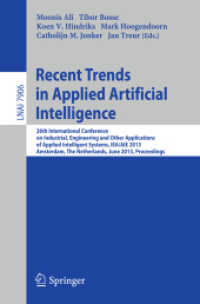- ホーム
- > 洋書
- > 英文書
- > History / World
Full Description
Professor Henri Stahl is one of Eastern Europe's leading authorities on peasant societies. For over thirty years he has studied peasant village communities in Romania, both in the field and from wide-ranging documentary sources. This book, one of Professor Stahl's major works, is based on this extensive research. The book is a study of the evolution of Romanian peasant society from the thirteenth century to the present, focusing particularly on the village communities of Wallachia and Moldavia, in which until quite recently communal villages still existed. Through a comparison of this type of village firstly with villages whose population was subjected to serfdom, and secondly with those which were free, but with private rather than communal property. Professor Stahl offers an interpretation of Romanian agrarian history. He argues that Romania moved from a communal form of social organization to a kind of tardy feudalism, provoked by the entry of capitalist market forces.
Contents
Introduction. The international framework of the problem and its Romanian aspects: 1. The international framework of the problem; 2. Hypotheses concerning the genesis of the Romanian feudal states; Part I. The internal life of two types of contemporary village communities: 'non-genealogical' and 'genealogical': 3. The free communities of the 'archaic' type; 4. Free evolved communities; 5. The former serf villages; Part II. The village communities of the peasants liable to corvée (eighteenth and nineteenth centuries): 6. The communities of corvée peasants; 7. The economic life of the corvée villages; Part III. The first forms of tributary exploitation of the village communities: 8. Prior considerations on the problem of the feudal conquest of the villages; 9. First forms of the seizure of the village communities; 10. The conquest of the village communities by the boyar class; 11. The great social crisis of serfdom; 12. First sings of the failure of serfdom; Conclusions. Some theoretical considerations.








